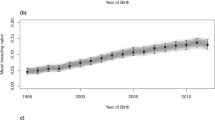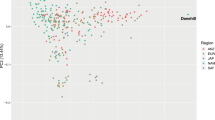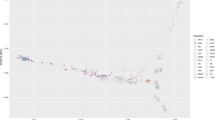Abstract
Thoroughbred horses have been bred exclusively for racing in England since Tudor times and thoroughbred horse racing is now practised in over 40 countries and involves more than half-a-million horses worldwide. The genetic origins of the thoroughbred go back largely to horses imported from the Middle East and North Africa to England in the late seventeenth and early eighteenth centuries1. Since the establishment of the Stud Book in 1791, the population has been effectively closed to outside sources, and over 80% of the thoroughbred population's gene pool derives from 31 known ancestors from this early period2. Despite intense directional selection, especially on the male side, and the generally high heritabilities of various measures of racing performance3–5, winning times of classic races have not improved in recent decades6. One possible explanation for this is that additive genetic variance in performance may have been exhausted in the face of strong selection7. To test this, we have estimated the genetic trend in performance over the period 1952–77 using TIMEFORM handicap ratings which are based entirely on the horse's own performance, and express its racing merit as a weight in pounds which the compilers believe the horse should carry in an average free-handicap race. These ratings take into account such factors as the firmness of the ground, the distance and the level of the competition. Our results indicate that the failure of winning times to improve is not due to insufficient genetic variance in the thoroughbred population as a whole.
This is a preview of subscription content, access via your institution
Access options
Subscribe to this journal
Receive 51 print issues and online access
$199.00 per year
only $3.90 per issue
Buy this article
- Purchase on Springer Link
- Instant access to full article PDF
Prices may be subject to local taxes which are calculated during checkout
Similar content being viewed by others
References
Willett, P. An Introduction to the Thoroughbred (Paul, London, 1975).
Mahon, G. A. T. Inbreeding and Infertility in Thoroughbred Horses (thesis, Dublin Univ. 1980).
Hintz, R. L. J. anim. Sci. 53, 582–594 (1980).
Langlois, B. Livest. prod. Sci. 7, 591–605 (1980).
Tolley, E. A., Notter, D. R. & Marlow, T. J. Anim. Breed. Abstr. 53, 163–185 (1985).
Cunningham, E. P. in Proc. Int. Symp. on Genetics and Horse Breeding, 2–8 (Royal Dublin Society, Dublin, 1975).
Marks, H. L. Proc. 2nd World Congress on Genetics Applied to Livestock Production, Madrid 5, 84–92 (1982).
Ponzoni, R. W. & James, J. W. Theor. appl. Genet. 53, 25–27 (1978).
Falconer, D. S. Introduction to Quantitative Genetics (Layner, London, 1981).
Hill, W. G. Animal Breeding Abstracts 40, 1–15 (1972).
Henderson, C. R. Biometrics 31, 423–447 (1975).
Smith, C. Anim. Prod. 4, 239–251 (1962).
Author information
Authors and Affiliations
Rights and permissions
About this article
Cite this article
Gaffney, B., Cunningham, E. Estimation of genetic trend in racing performance of thoroughbred horses. Nature 332, 722–724 (1988). https://doi.org/10.1038/332722a0
Received:
Accepted:
Issue Date:
DOI: https://doi.org/10.1038/332722a0
This article is cited by
-
Genetic improvement of speed across distance categories in thoroughbred racehorses in Great Britain
Heredity (2023)
-
Genomic inbreeding trends, influential sire lines and selection in the global Thoroughbred horse population
Scientific Reports (2020)
-
Similar rates of morphological evolution in domesticated and wild pigs and dogs
Frontiers in Zoology (2018)
-
Genetic profiling of thoroughbred racehorses by microsatellite marker analysis
Genes & Genomics (2014)
-
The genetic origin and history of speed in the Thoroughbred racehorse
Nature Communications (2012)
Comments
By submitting a comment you agree to abide by our Terms and Community Guidelines. If you find something abusive or that does not comply with our terms or guidelines please flag it as inappropriate.



